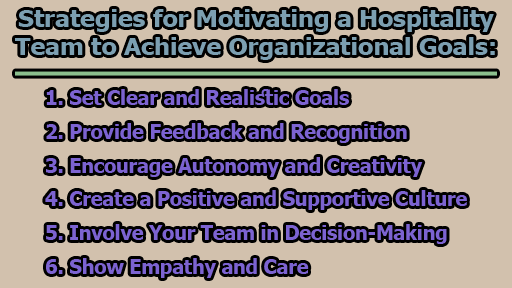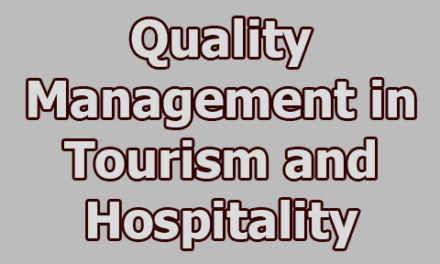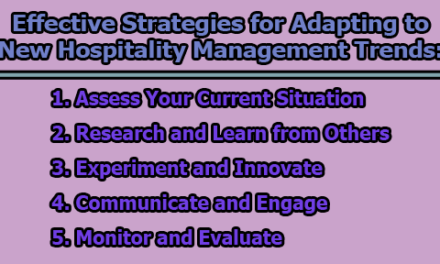Strategies for Motivating a Hospitality Team to Achieve Organizational Goals:
In the fast-paced and competitive world of hospitality, effective leadership and motivation of the team are critical factors in achieving organizational success. A motivated and engaged team can make the difference between a thriving establishment and a struggling one. In this article, we will explore some of the essential strategies for motivating a hospitality team to achieve organizational goals.
1. Set Clear and Realistic Goals: One of the foundational principles of motivating a hospitality team is the establishment of clear and realistic goals that are in alignment with the organization’s vision and mission. These goals should adhere to the SMART criteria, which stands for Specific, Measurable, Achievable, Relevant, and Time-bound.
Specific goals provide clear direction and focus for the team. Measurable goals allow for tracking progress and determining when they have been achieved. Achievable goals ensure that they are realistic and attainable, rather than being overly ambitious. Relevant goals must directly contribute to the overall success of the organization. Time-bound goals come with a specific timeframe for completion, creating a sense of urgency.
However, it’s not enough for managers to set these goals in isolation. They should involve their team members in this process, creating a sense of ownership and alignment with the goals. This collaborative approach ensures that goals are not only clear but also meaningful to the team, setting the stage for motivation and commitment.
2. Provide Feedback and Recognition: Regular and constructive feedback is an indispensable tool for motivating a hospitality team. Feedback offers team members valuable insights into their performance, allowing them to make improvements, learn from their mistakes, and grow professionally. Furthermore, feedback fosters open lines of communication between managers and team members, creating a culture of transparency and trust.
Recognition, on the other hand, acknowledges and appreciates the efforts, achievements, and contributions of the team. It’s important to recognize both individual and collective accomplishments, as this reinforces the idea that every team member plays a vital role in the organization’s success. Recognition can take various forms, including personal conversations, formal performance reviews, rewards, incentives, or public praise.
The combination of feedback and recognition provides motivation and guidance, fostering a sense of achievement and fulfillment among team members.
3. Encourage Autonomy and Creativity: Motivation in the hospitality industry is not solely about extrinsic rewards. It also involves fostering intrinsic motivation, which often comes from a sense of autonomy and creativity. Autonomy, in this context, means granting team members the freedom and responsibility to make decisions, solve problems, and manage their own work.
When employees have the autonomy to make choices and decisions, it empowers them to take ownership of their roles and become more engaged in their work. This empowerment can lead to greater job satisfaction and motivation.
Creativity, on the other hand, involves allowing team members to express their ideas, suggestions, and innovations. Encouraging creativity can result in fresh perspectives, new solutions to challenges, and a more vibrant work environment. It’s essential to create a culture that values and nurtures creative thinking, as it can lead to innovative approaches that drive the organization’s success.
By encouraging autonomy and creativity, hospitality managers can create a work environment where team members feel a strong sense of ownership, engagement, and empowerment.
4. Create a Positive and Supportive Culture: A positive and supportive workplace culture is a cornerstone of team motivation. Such a culture values respect, trust, collaboration, diversity, and inclusion. It also promotes continuous learning, development, and overall well-being.
Hospitality managers play a significant role in shaping the culture of their establishment. Here are some key steps they can take to create and maintain a positive and supportive culture:
- Lead by Example: Managers should exemplify the values and behaviors they want to see in their team. This includes treating all team members with respect, showing trust in their abilities, and demonstrating a commitment to collaboration and inclusivity.
- Communicate Openly and Honestly: Effective communication is vital in creating a culture of trust and transparency. Managers should foster open lines of communication, encouraging team members to voice their opinions and concerns.
- Resolve Conflicts Constructively: Conflicts are inevitable in any workplace, but how they are managed makes a significant difference. Managers should address conflicts promptly and constructively, promoting healthy resolutions that strengthen relationships.
- Celebrate Successes: Recognizing and celebrating both small and significant achievements can boost team morale. It creates a sense of accomplishment and pride in the organization’s goals and successes.
- Provide Opportunities for Growth and Development: Offering training, mentorship, and career development opportunities can help team members grow professionally and feel invested in their future within the organization.
Creating and nurturing a positive and supportive culture in the hospitality industry ensures that team members feel valued and motivated to contribute their best to the organization.
5. Involve Your Team in Decision-Making: Involving team members in the decision-making process is a powerful way to motivate them. This approach goes beyond merely implementing top-down directives and policies; it means asking for their opinions, feedback, and input on matters that affect their work and the organization as a whole.
Team members often have valuable insights and perspectives that can lead to more informed decisions and innovative solutions. When they see their input being valued and incorporated into decision-making, they develop a stronger sense of ownership and commitment to the organization’s goals. To effectively involve the team in decision-making, managers should:
- Seek Input: Actively ask for team members’ opinions and feedback on relevant issues.
- Listen Actively: Pay close attention to what team members have to say, and consider their views seriously.
- Acknowledge Concerns: Recognize and address any concerns or reservations that team members may express.
- Incorporate Suggestions: Whenever feasible, integrate their suggestions into the decision-making process.
By involving the team in decision-making, managers demonstrate that they value and respect their expertise, experience, and perspectives. This inclusive approach fosters a sense of shared responsibility and purpose, motivating team members to contribute actively to the organization’s goals.
6. Show Empathy and Care: Empathy and care are fundamental elements of team motivation. Empathy involves understanding and sharing the feelings, thoughts, and experiences of team members. Care entails showing genuine interest, concern, and support for their well-being. To demonstrate empathy and care, managers should:
- Be Attentive: Pay attention to team members’ needs, challenges, and emotions. Show that you are genuinely interested in their well-being.
- Be Compassionate: Demonstrate a compassionate and understanding attitude towards team members, especially during challenging times.
- Be Responsive: Address team members’ needs and concerns promptly and effectively. Show that you are there to support them when they need it.
- Provide Flexibility: Offering flexible work arrangements, such as accommodating personal needs or family situations, can demonstrate care and support for your team.
- Ensure Health and Safety: Prioritizing the health and safety of team members is a clear sign of care. This includes implementing safety protocols and providing resources for wellness.
When team members feel that their managers are attentive, compassionate, and responsive, they are more likely to be motivated and engaged in their work. This, in turn, enhances their commitment to achieving organizational goals.
In conclusion, motivating a hospitality team to meet organizational goals is an ongoing process that requires commitment and a multi-faceted approach. By setting clear and realistic goals, providing feedback and recognition, encouraging autonomy and creativity, fostering a positive culture, involving your team in decision-making, and showing empathy and care, you can create a work environment that inspires and empowers your team to excel. When employees are motivated and engaged, they are more likely to contribute enthusiastically towards the achievement of organizational objectives, leading to success in the highly competitive hospitality industry.

Library Lecturer at Nurul Amin Degree College










